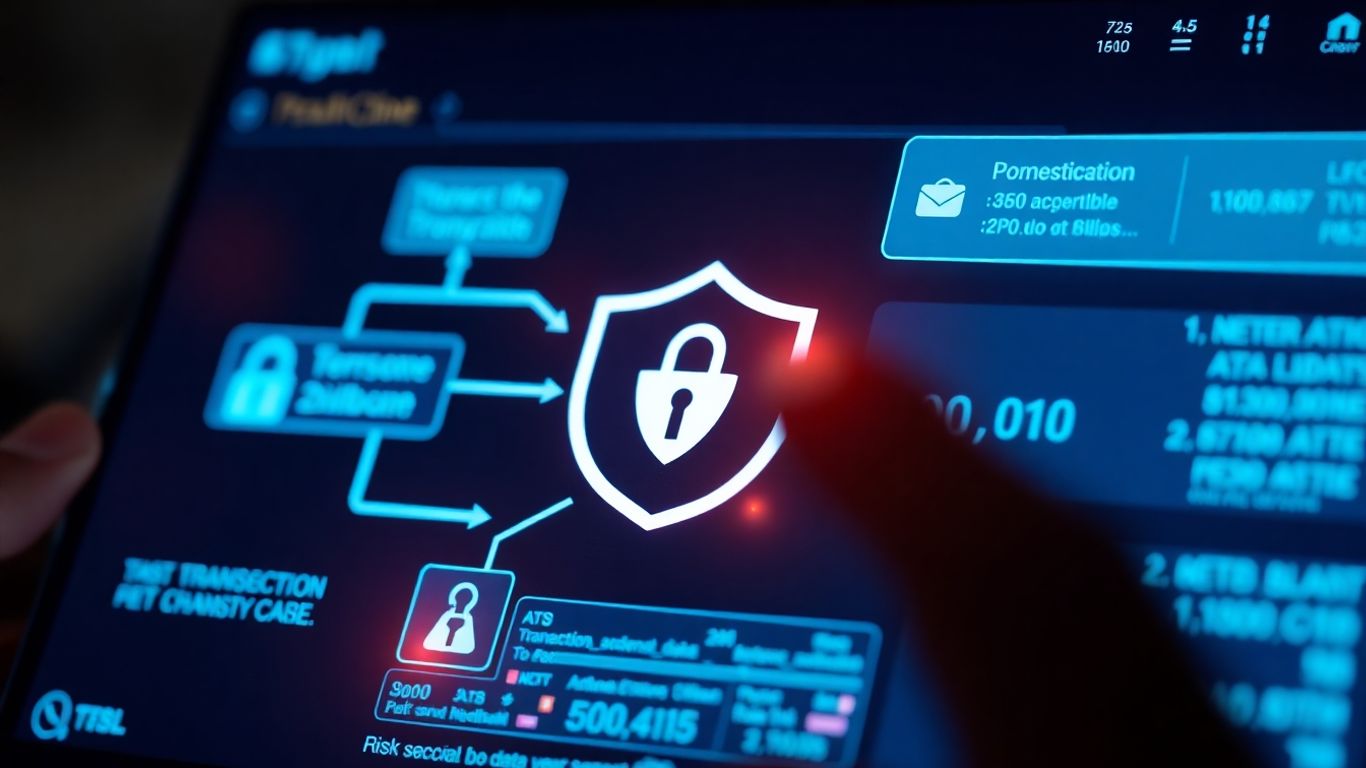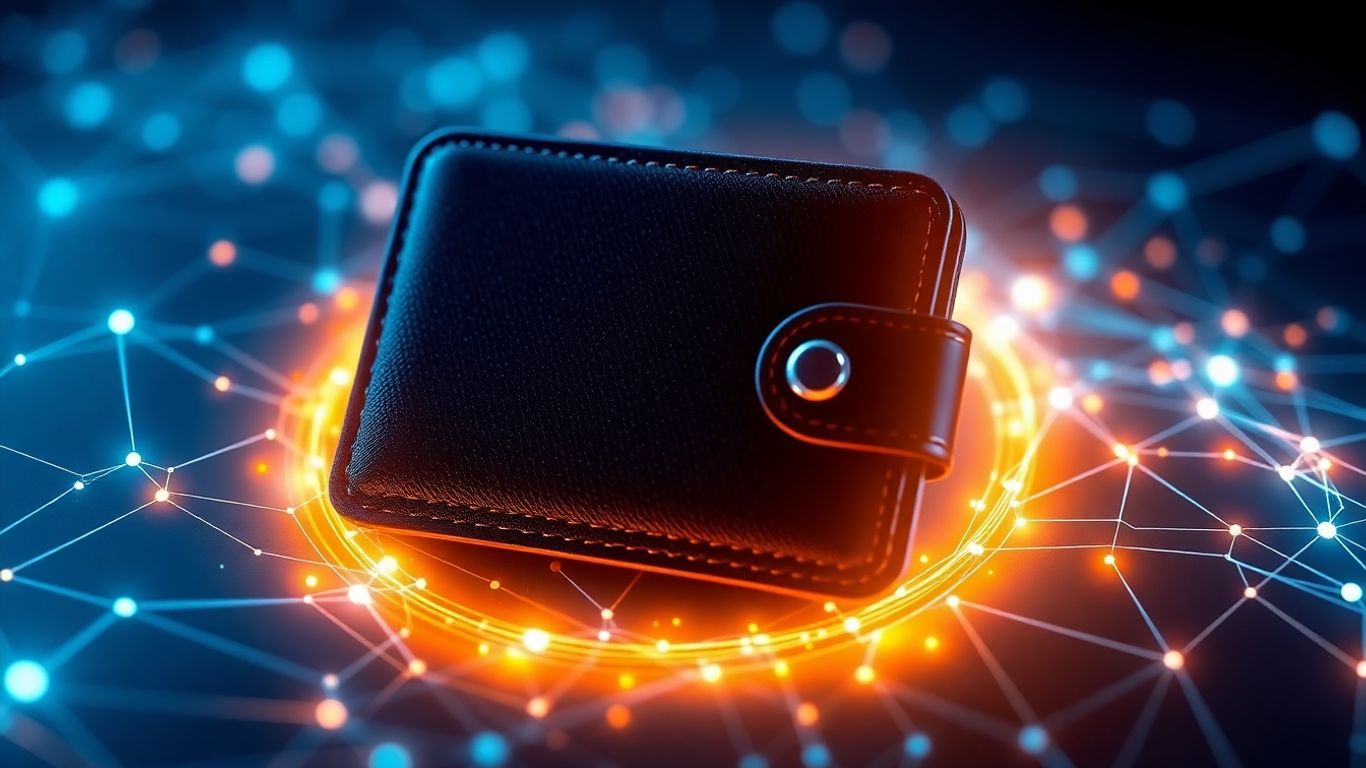[ newsletter ]
Stay ahead of Web3 threats—subscribe to our newsletter for the latest in blockchain security insights and updates.
Thank you! Your submission has been received!
Oops! Something went wrong. Please try again.
Explore the Wallet Screening API for robust risk and sanctions checks. Ensure compliance and mitigate financial crime with advanced blockchain analytics.





Keeping up with digital currency can feel like a constant race, especially when it comes to staying on the right side of regulations. You've probably heard about the need to screen crypto wallets, and that's where a wallet screening API comes in handy. It's basically a tool that helps check if a digital wallet is linked to anything risky or against the rules, like sanctions. This is super important for businesses and even law enforcement to prevent illegal stuff from happening in the crypto world. We'll look at how these tools work and why they're becoming a big deal.

Wallet screening is essentially a digital check-up for cryptocurrency addresses. Think of it like a background check for a digital wallet. It's the process of looking at a specific crypto address and figuring out if it's linked to anything risky or problematic. This is super important in the crypto world because, let's be honest, it can be a bit of a wild west out there. We want to make sure digital money isn't being used for shady stuff like money laundering, funding illegal activities, or outright scams. By analyzing blockchain data, we can get a pretty good idea of a wallet's history and its connections. It’s a key part of keeping the crypto space safer and more transparent for everyone involved.
So, how does this actually happen? It's not magic, it's data analysis. When a wallet address is screened, it's compared against massive databases. These databases contain information on addresses that have been flagged for various reasons – maybe they're linked to sanctioned individuals, known criminal operations, or have been involved in scams. The screening process looks at a few things:
This whole process helps identify potentially problematic wallets before they can cause trouble. It's a proactive way to manage risk in digital asset transactions. You can find out more about how these systems work by looking into wallet screening services.
Law enforcement agencies find wallet screening incredibly useful for a number of reasons. It's a powerful tool for tracking down illicit funds and understanding criminal networks. For instance:
Essentially, wallet screening gives law enforcement the visibility they need to combat financial crime in the digital asset space. It helps them map out criminal activities and recover stolen property.
When you're dealing with digital assets, keeping things on the straight and narrow is pretty important. That's where a Wallet Screening API comes in handy. It's basically a tool that checks crypto wallet addresses to see if they're linked to anything shady, like illegal activities or people on watchlists. This is a big deal for staying compliant with all sorts of rules and regulations.
Governments and international bodies put out lists of individuals and groups that are sanctioned. If a crypto transaction involves a wallet linked to someone on these lists, it's a no-go. A Sanctions Screening API can check wallet addresses against these official lists in real-time. This helps businesses avoid accidentally processing transactions with sanctioned entities, which could lead to some serious penalties.
It's not just about avoiding fines, though. It's about making sure the crypto space isn't being used to fund things like terrorism or human trafficking. By screening wallets against sanctions lists, companies are playing their part in keeping the financial system clean.
Things move fast in the crypto world, so you need tools that can keep up. A good Wallet Screening API works in real-time. This means as soon as a transaction or a wallet address is submitted for checking, the API gets to work. It compares the address against a wide range of global watchlists, not just sanctions lists, but also lists of known scammers, hackers, and addresses associated with illicit marketplaces.
Think of it like this:
This kind of broad, real-time checking is what helps businesses build a robust compliance framework. It’s about having eyes on potential risks as they emerge.
Adding new tools to your existing setup can sometimes be a headache. That's why a well-designed Wallet Screening API is built to be easy to integrate. It usually works by sending a request with a wallet address and getting back a risk score or a flag indicating whether the address is clean or potentially risky. This kind of integration means you can plug it into your current transaction processing, customer onboarding, or risk management systems without a massive overhaul.
For example, a crypto exchange could integrate this API into their user sign-up process. When a new user provides a wallet address, the API can instantly check it. If it flags as high-risk, the exchange can then ask for more information or even deny the account creation, all before any funds are moved.
The speed and accuracy of these checks are paramount. A system that takes too long or incorrectly flags legitimate users can disrupt business operations and damage customer trust. The goal is to automate compliance checks efficiently, allowing teams to focus on higher-level risk management and strategic decisions rather than manual data verification.
When you're looking at tools to screen crypto wallets, it's not just about ticking a box. These systems actually do a lot to keep things safer and smoother. Think of them as your digital bouncers, checking IDs and making sure no troublemakers get in.
This is a big one. Instead of someone manually checking every single wallet address, which would take forever and probably lead to mistakes, these tools do it automatically. They look at a wallet's history, where its money has been, and if it's ever touched anything shady. It's like having a super-fast detective who can instantly tell you if a wallet has a criminal record. This process assigns a risk score, helping you quickly sort out which wallets need a closer look.
The real benefit here is freeing up your team to focus on the exceptions, the really tricky cases, instead of getting bogged down in routine checks. It makes your whole operation run a lot more efficiently.
It's not a one-and-done deal. The crypto world moves fast, and bad actors are always trying new tricks. That's why continuous monitoring is so important. These tools keep an eye on wallets even after the initial check. If a wallet suddenly starts acting weird – maybe it's suddenly interacting with known scam sites or using mixers to hide its tracks – the system flags it. This means you can catch problems early, before they become big issues.
Wallet screening doesn't exist in a vacuum. The best tools fit right into your existing Know Your Customer (KYC) and Anti-Money Laundering (AML) procedures. This means you can combine wallet risk data with customer identity information to get a much clearer picture of the overall risk. It makes your compliance efforts more robust and helps you meet regulatory requirements more easily. Imagine onboarding a new customer and instantly seeing both their verified identity and the risk profile of their associated wallet – it streamlines everything.
Wallet screening, while a powerful tool for compliance and security, isn't without its hurdles. It's a bit like trying to catch smoke – the very nature of digital assets and the networks they run on presents unique difficulties. We've got to talk about these, because understanding them is key to actually making this work.
One of the biggest headaches is getting the screening just right. You want to catch the bad actors, but you don't want to flag every other person as a risk. Too many false positives – where legitimate wallets get flagged – can really mess things up. It wastes time, resources, and can even block perfectly normal transactions. It’s a balancing act, trying to tune the systems so they're sharp enough to catch illicit activity without being so overzealous they cause chaos. Think of it like a security guard who stops everyone who walks by; they might catch a thief eventually, but they'll also annoy a lot of innocent people.
Then there's the privacy aspect. Blockchains are often pseudonymous, meaning transactions are tied to wallet addresses, not directly to real people. This makes it tough to know who's actually behind a wallet without extra information, like Know Your Customer (KYC) data. Plus, some cryptocurrencies are designed specifically for privacy, using techniques like mixers and tumblers to obscure transaction trails. These privacy coins, like Monero or Zcash, are a real challenge for screening tools because they actively work against transparency. It’s a constant cat-and-mouse game where new methods to hide activity are always popping up.
Finally, the bad guys aren't standing still. They're constantly changing their tactics. We're seeing more complex schemes, like 'chain-hopping' where funds jump between different blockchains to make them harder to track, or using decentralized finance (DeFi) platforms in novel ways to hide money. Criminals are also getting faster at adapting to new security measures. This means wallet screening tools and the teams behind them need to be just as agile, constantly updating their databases and analytical methods. It’s not a set-it-and-forget-it kind of deal; it requires continuous learning and adaptation to stay ahead of emerging threats. For instance, Veritas Protocol leverages AI for enhanced blockchain security by continuously monitoring and adapting to these changing patterns.
The digital asset space is dynamic. What works today might be outdated tomorrow. This means that the tools and strategies used for wallet screening must be equally dynamic, capable of evolving alongside the threats they aim to counter. Continuous improvement isn't just a good idea; it's a necessity for effective risk management in this environment.
Crypto businesses really need to keep up with all the rules about money laundering and stopping terrorism financing. It's not just about avoiding fines, though that's a big part of it. Wallet screening helps make sure you're not accidentally dealing with bad actors or sanctioned individuals. Think about it: if a wallet is linked to a known scam or a terrorist group, you definitely don't want your platform to be the next stop for those funds. This means checking wallets against global sanctions lists, like those from OFAC, and also looking for patterns that suggest suspicious activity. It's a constant job, keeping up with evolving threats and making sure your systems are robust enough to catch them.
The crypto space moves fast, and staying compliant means being proactive. It's about building trust with users and regulators alike by showing you take these risks seriously.
Beyond just compliance, actively screening wallets is a solid way to cut down on the risks associated with financial crime. If you can spot wallets tied to ransomware attacks, fraud rings, or even just general illicit marketplaces, you can block those transactions before they even hit your platform. This protects not only your business from reputational damage and potential legal issues but also your customers from becoming victims. It's like having a digital bouncer at the door, checking IDs and making sure only legitimate guests get in.
Sometimes, crypto businesses end up being a key part of investigations. When law enforcement needs to trace stolen funds or track down criminal networks, the data generated by wallet screening tools can be incredibly useful. Being able to provide transaction histories, identify connections between wallets, and even help freeze illicit assets when requested can make a huge difference. It's a partnership that helps keep the whole ecosystem safer. This collaboration often involves sharing insights and data, which is made much easier when you have structured information from your screening processes.

So, you've got a bunch of crypto wallets you're dealing with, right? Whether it's for your business or just keeping track of your own stuff, knowing who or what is behind those addresses is pretty important. That's where wallet trust scores come in. Think of it like a quick credit check, but for crypto wallets. These scores look at a wallet's history – like what kind of transactions it's been involved in, if it's ever touched anything shady, or if it's linked to known bad actors. It’s not just about one transaction; it’s about the whole picture. This stuff can give you a pretty good idea if a wallet is safe to interact with or if you should probably steer clear. It’s all about getting that instant risk assessment without having to dig through tons of data yourself.
Okay, so the crypto world moves at lightning speed, and security threats are always popping up. Relying on old-school, one-time checks just doesn't cut it anymore. What you really need is something that's always watching, always learning. That's where AI-powered continuous monitoring comes in. Imagine having a smart system that's constantly scanning transactions, looking for weird patterns, and flagging anything that looks even a little bit off. It's like having a security guard who never sleeps and has a PhD in spotting trouble. This kind of setup uses artificial intelligence to analyze everything in real-time, spotting new kinds of attacks as they happen, not after the damage is done. It’s a pretty big step up from just checking things once in a while.
Smart contracts are the backbone of a lot of what happens in crypto, but they can also be a weak spot if they're not built right. That's why smart contract trust scores are becoming a thing. These scores give you a snapshot of how secure a particular smart contract is, right there on the blockchain. They look at things like the contract's code, how it's set up to run, and if it has a history of problems. It’s not just about whether the code has bugs, but also about how it's managed and if it's been involved in any messy situations before. Getting a trust score for a smart contract means you can get a quick, objective look at its security before you interact with it, which is super handy for avoiding potential headaches down the line. It’s a way to get a feel for the safety of the code itself.
Here's a quick look at what goes into these scores:
The goal here is to move beyond just looking at a static audit report. Instead, you get a dynamic, up-to-date assessment of risk, which is way more useful in the fast-paced crypto environment. It helps everyone involved make smarter decisions about what to trust.
So, you've decided a wallet screening API is the way to go for your crypto operations. That's a smart move, honestly. But how do you actually get this tech working within your existing setup? It's not just about picking a tool; it's about making it a natural part of how you do business.
First things first, you need to pick the right service. Think about what you really need. Are you just trying to avoid sanctioned addresses, or do you need to dig deeper into transaction patterns? Some services are better for basic compliance, while others offer more advanced analytics. You'll want to look at:
The crypto world moves fast, and so do the risks. Your screening tools need to keep pace, offering real-time checks and adapting to new threats as they emerge.
Once you've chosen a provider, the next step is getting it integrated. This is where the API comes in. A well-designed API should be pretty straightforward to connect with your current systems, whether that's your customer onboarding flow or your transaction monitoring software. This allows you to automate checks, which is key for handling a large volume of transactions without slowing things down. It means you can scale your compliance efforts as your business grows. You're essentially building a bridge between the screening service and your own tech stack, making sure data flows smoothly and automatically. This kind of integration is what helps you stay compliant without needing a massive team dedicated solely to manual checks. You can get real-time address screening against global watchlists with this approach.
Finally, having a wallet screening API isn't just about doing the checks; it's also about proving you're doing them. When auditors or regulators come knocking, you need to show them you have a solid process in place. A good API integration will log all your screening activities. This creates a clear, auditable trail of who was screened, when, and what the results were. It makes it much easier to demonstrate that you're meeting your regulatory obligations and actively managing risk. Having these records readily available means you're always prepared, reducing stress during any compliance review. It shows you're serious about security and staying on the right side of the rules.
So, we've looked at how important it is to screen wallets and check for sanctions. It's clear that as the crypto world grows, so do the risks. Things like smart contract trust scores and wallet trust scores are becoming more common, giving us better ways to see potential problems before they happen. We also saw how new tools are being made to help recover assets if the worst occurs. Keeping up with these changes means constantly looking at new security methods, like AI-powered checks and continuous monitoring, to stay ahead of bad actors. It's a big job, but necessary for keeping the whole system safer for everyone involved.
Wallet screening is like checking a digital address to see if it's connected to anything bad. We look at crypto wallet addresses to figure out if they're risky or linked to shady people or groups. It's a key part of making sure digital money isn't used for illegal stuff like money laundering or funding bad things. It helps keep the crypto world safer and more open.
It works by comparing crypto wallet addresses to lists of known risky or banned addresses. Think of it like checking a name against a list of people who shouldn't be allowed in. We also look at how money moves in and out of the wallet to spot weird patterns, like super fast transfers or using special services to hide where money came from. Then, we give the wallet a risk score based on all this info.
For law enforcement, it's like a detective tool for digital money. They use it to follow the trail of money from crimes like drug deals or scams. It helps them find out who is involved in illegal activities, even when they try to hide. They can also use it to find and possibly get back stolen money or freeze funds before criminals can move them.
Crypto businesses use wallet screening to follow the rules. It helps them make sure they aren't dealing with people or groups who are on official sanction lists. It's also good for stopping money laundering and making sure their customers are safe. By checking wallets, they can avoid legal problems and keep their reputation clean.
One big issue is privacy. Since crypto transactions are often anonymous, it's hard to know who is really behind a wallet address. Also, sometimes the screening tools might accidentally flag a good wallet as bad, which can cause problems. Plus, criminals are always finding new ways to hide their tracks, so the screening methods need to keep up.
When picking a wallet screening tool, you need to make sure it's really good at spotting risks without making too many mistakes (false positives). It should also follow all the important rules and laws. Speed is important too, so it can check things quickly. Lastly, it's good if the company behind the tool offers help and support to make sure you're using it correctly.


